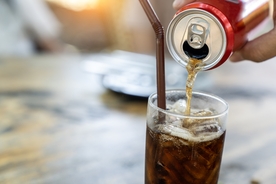Every day when I get into work, I speak at length with my colleagues about how if I don't have my morning coffee I will be very tempted to bite somebody. They think I'm kidding, but I'm not. Although energy drinks aren't good for you and caffeine pills come with their own litany of issues, I would say the smell of coffee is enough to get me going in the morning, but I'd really need the taste too.
I'm sure I'm not the only one with a coffee addiction here, and although there are some people who think tea is a better option for staying hydrated, a study suggests that soon enough, we'll outlive all those coffee haters. Feel free to pour yourself a cup of coffee as we go through what this study means for you.

The results of this study, published in the journal JAMA Internal Medicine, took a look at around 500,000 people in the United Kingdom, with roughly 75 percent of them being coffee drinkers (387,494). There, they found that the coffee drinkers who drank between two and five cups of coffee a day were around 12 percent less likely to die over a 10-year period than their non-coffee-drinking counterparts.
People who had six or seven were 16 percent less likely to die, but at eight cups or more, that went down to 14 percent. It didn't matter if it was regular, decaf or instant, either - regardless of the type of coffee, the effects were seen across the board (though they were slightly less pronounced with the instant stuff).
The results didn't even change if the subjects metabolised coffee more slowly:
"Coffee drinking was inversely associated with mortality, including among those drinking 8 or more cups per day and those with genetic polymorphisms indicating slower or faster caffeine metabolism. These findings suggest the importance of noncaffeine constituents in the coffee-mortality association and provide further reassurance that coffee drinking can be a part of a healthy diet."

Of course, these results don't necessarily show that coffee's the cause of this increased resilience to death; it only shows that people who drank coffee in that 10-year period tended to live longer on average. But other research has suggested that coffee drinkers are also less likely to develop Type 2 diabetes, depression, Alzheimer's, dementia, liver cirrhosis, and heart disease, as well as several forms of cancer.
One study which looked at around 50,000 women showed that drinking at least one cup of coffee a week was associated with around a 15 percent reduced risk for depression, while two to three cups saw a 20 percent reduced risk. As caffeine is a stimulant, however, the same can't be said for anxiety.

So there you have it, folks. Drinking coffee isn't a way of life for everybody, that's for sure, but for those of you who enjoy a nice cuppa or five a day, you can feel a little bit more secure in knowing that your morning cup is capable of giving you life in more ways than one.


